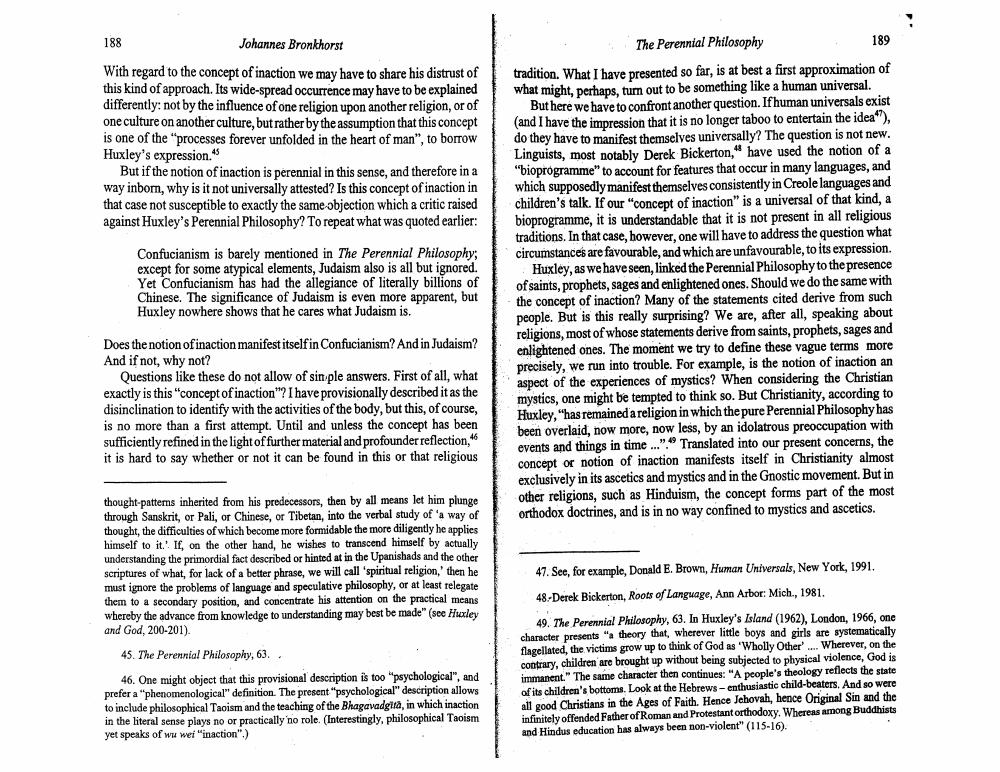________________ 188 Johannes Bronkhorst With regard to the concept of inaction we may have to share his distrust of this kind of approach. Its wide-spread occurrence may have to be explained differently: not by the influence of one religion upon another religion, or of one culture on another culture, but rather by the assumption that this concept is one of the processes forever unfolded in the heart of man", to borrow Huxley's expression.45 But if the notion of inaction is perennial in this sense, and therefore in a way inborn, why is it not universally attested? Is this concept of inaction in that case not susceptible to exactly the same objection which a critic raised against Huxley's Perennial Philosophy? To repeat what was quoted earlier: Confucianism is barely mentioned in The Perennial Philosophy; except for some atypical elements, Judaism also is all but ignored. Yet Confucianism has had the allegiance of literally billions of Chinese. The significance of Judaism is even more apparent, but Huxley nowhere shows that he cares what Judaism is. : The Perennial Philosophy . 189 tradition. What I have presented so far, is at best a first approximation of what might, perhaps, turn out to be something like a human universal. But here we have to confront another question. If human universals exist (and I have the impression that it is no longer taboo to entertain the idea47), do they have to manifest themselves universally? The question is not new. Linguists, most notably Derek Bickerton,48 have used the notion of a "bioprogramme" to account for features that occur in many languages, and which supposedly manifest themselves consistently in Creole languages and children's talk. If our "concept of inaction" is a universal of that kind, a bioprogramme, it is understandable that it is not present in all religious traditions. In that case, however, one will have to address the question what circumstances are favourable, and which are unfavourable, to its expression. * Huxley, as we have seen, linked the Perennial Philosophy to the presence of saints, prophets, sages and enlightened ones. Should we do the same with the concept of inaction? Many of the statements cited derive from such people. But is this really surprising? We are, after all, speaking about religions, most of whose statements derive from saints, prophets, sages and enlightened ones. The moment we try to define these vague terms more precisely, we run into trouble. For example, is the notion of inaction an aspect of the experiences of mystics? When considering the Christian mystics, one might be tempted to think so. But Christianity, according to Huxley, "has remained a religion in which the pure Perennial Philosophy has been overlaid, now more, now less, by an idolatrous preoccupation with events and things in time ...".49 Translated into our present concerns, the concept or notion of inaction manifests itself in Christianity almost exclusively in its ascetics and mystics and in the Gnostic movement. But in other religions, such as Hinduism, the concept forms part of the most orthodox doctrines, and is in no way confined to mystics and ascetics. Does the notion of inaction manifest itself in Confucianism? And in Judaism? And if not, why not? Questions like these do not allow of sin ple answers. First of all, what exactly is this "concept of inaction"? I have provisionally described it as the disinclination to identify with the activities of the body, but this, of course, is no more than a first attempt. Until and unless the concept has been sufficiently refined in the light of further material and profounder reflection,46 it is hard to say whether or not it can be found in this or that religious thought-patterns inherited from his predecessors, then by all means let him plunge through Sanskrit, or Pali, or Chinese, or Tibetan, into the verbal study of a way of thought, the difficulties of which become more formidable the more diligently he applies himself to it.?. If, on the other hand, he wishes to transcend himself by actually understanding the primordial fact described or hinted at in the Upanishads and the other scriptures of what, for lack of a better phrase, we will call 'spiritual religion,' then he must ignore the problems of language and speculative philosophy, or at least relegate them to a secondary position, and concentrate his attention on the practical means whereby the advance from knowledge to understanding may best be made" (see Huxley and God, 200-201). 45. The Perennial Philosophy, 63., 46. One might object that this provisional description is too "psychological", and prefer a "phenomenological" definition. The present"psychological" description allows to include philosophical Taoism and the teaching of the Bhagavadgita, in which inaction in the literal sense plays no or practically'no role. (Interestingly, philosophical Taoism yet speaks of wu wei "inaction".) 47. See, for example, Donald E. Brown, Human Universals, New York, 1991. -48-Derek Bickerton, Roots of Language, Ann Arbor: Mich., 1981. 49. The Perennial Philosophy, 63. In Huxley's Island (1962), London, 1966, one character presents "a theory that, wherever little boys and girls are systematically flagellated, the victims grow up to think of God as 'Wholly Other'.... Wherever, on the contrary, children are brought up without being subjected to physical violence, God is immanent." The same character then continues: "A people's theology reflects the state of its children's bottoms. Look at the Hebrews - enthusiastic child-beaters. And so were all good Christians in the Ages of Faith. Hence Jehovah, hence Original Sin and the infinitely offended Father of Roman and Protestant orthodoxy. Whereas among Buddhists and Hindus education has always been non-violent" (115-16).




